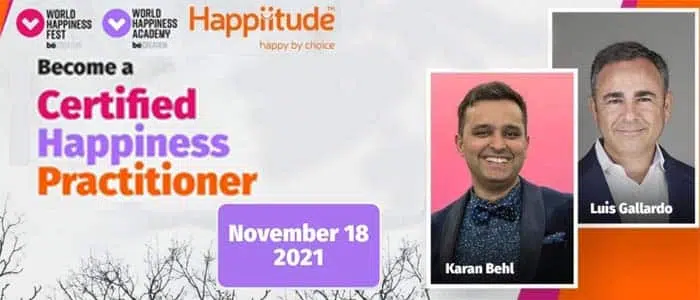
Embracing Diversity: The World Happiness Foundation’s Vision for a World Free of Labels
In a society that often prioritizes conformity, the World Happiness

Marc Brackett is the author of “Permission to Feel”, research psychologist and the Founding Director of the Yale Center for Emotional Intelligence and Professor in the Child Study Center at Yale University.
I think most people are looking for strategies to be happy and, while I think happiness is important, I think it can’t be the only goal because what happens is: if we strive all the time just to be happy, we’re missing out on the informational value of frustration, anxiety and stress. So to me it’s more about a balance of emotion and I do feel strongly that we want to experience more pleasant emotions than unpleasant ones in life, but we don’t want to get rid of the negative ones.
Before being Emotionally Intelligent
When I was thinking about writing a book on Emotional Intelligence actually I was: “do I call it Emotional Intelligence?” and I was like: “I don’t think so”. There’s something deeper that I think we have to get to before we learn about Emotional Intelligence and I think it’s what I call “Permission to Feel”.
My first hope is that we create a world where people have the Permission to Feel all emotions; where they feel safe and valued and capable of doing that. I think we need to become curious explorers of our feelings —I call that being an Emotion Scientist versus an Emotion Judge— so, wanting to get critical, am I feeling angry or am I just irritated, am I jealous or am I envious, am I stressed or am I overwhelmed.
And then, we have to become skilled. Emotional Intelligence is about using our emotions wisely so i call those skills “The ruler skills” and there are 5:
What do we feel?
I think most people are looking for strategies to be happy and, while I think happiness is important, I think it can’t be the only goal because what happens is that, if we strive all the time just to be happy, then we’re missing out on the informational value of frustration, anxiety and stress. To me it’s more about a balance of emotion and I do feel strongly that we want to experience more pleasant emotions than unpleasant ones in life but we don’t want to get rid of the negative ones.
I think that we’re more complex than we give ourselves credit for. People always say “how are you feeling, Mark, during the pandemic?” I’m really anxious, there’s a lot of uncertainty out here. But I’m also feeling optimistic, hopeful, content, and happy certain days, so our bodies and brains can handle more than one feeling at a time.
To be honest with you, everything that’s happened this year has made me even more passionate about the work that our center does. It made me realize even more so how unprepared we were to support ourselves and others and what we have found was: the number one feeling is anxiety. We’ve got to find creative ways to help people experience more pleasant emotions in these really horrific times.
Give yourself Permission to Feel
One of our signature tools is the mood meter element and that is our tool for building self-awareness. In my book I give you the cheat sheet, you get your first hundred words to talk about your feelings. A big part of the ruler is embedding these tools so one of them is called “The Emotional Intelligence Charter” which is: we know how we’re feeling, we collect all of the feelings that the people said they want to feel —alive, for example— and then we have conversations around what are we going to do to feel more alive, what does that mean to feel alive, what are we going to say to each other every day to feel more of that. Then the mood meters, self-awareness, how am I feeling, how are you feeling specifically, what are my strategies.
We’ve got other tools we call “The Meta Moment” which is how to be your best self and deal with those things that activate you, so we teach people how to manage those difficult moments and those triggers and then tools to be better at perspective taking and interpersonal problems. Real essential skills that we need, they are above and beyond the academic skills that most people focus on as goals.
When we’re activated we don’t really think about others and also, when we fail we tend to be self-righteous. And, yes my book is called “Permission to Feel” but we also got to give ourselves the permission to fail, apologize, ask for forgiveness, and try to move on because, otherwise, my goodness we’re just going to be drained all the time.
I’m gonna give you the magic dust, I grant you now the permission to feel all emotions!


In a society that often prioritizes conformity, the World Happiness

In a world often marred by conflicts and strife, the

In a world that is increasingly interconnected, the pervasive spread